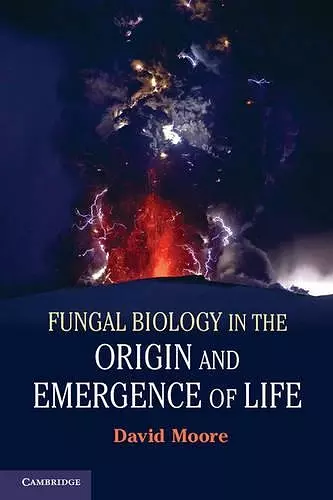Fungal Biology in the Origin and Emergence of Life
Format:Paperback
Publisher:Cambridge University Press
Published:24th Jan '13
Should be back in stock very soon

A unique account of life's evolution using the most recent research and weaving evolution of fungi into evolution of eukaryotes.
Casting aside common theories on life's origins, this is a mycological perspective on the emergence of life on Earth. Moore describes how the first biofilms contributed to the formation of unicellular stem eukaryotes, highlighting the role of the fungal grade of organisation in the evolution of higher organisms.The rhythm of life on Earth includes several strong themes contributed by Kingdom Fungi. So why are fungi ignored when theorists ponder the origin of life? Casting aside common theories that life originated in an oceanic primeval soup, in a deep, hot place, or even a warm little pond, this is a mycological perspective on the emergence of life on Earth. The author traces the crucial role played by the first biofilms – products of aerosols, storms, volcanic plumes and rainout from a turbulent atmosphere – which formed in volcanic caves 4 billion years ago. Moore describes how these biofilms contributed to the formation of the first prokaryotic cells, and later, unicellular stem eukaryotes, highlighting the role of the fungal grade of organisation in the evolution of higher organisms. Based on the latest research, this is a unique account of the origin of life and its evolutionary diversity to the present day.
'In a wonderful introduction to this wide and exciting subject, and ensuring accessibility to non-specialist readers, key features of fungal biology are introduced, as is current thinking on the beginnings of the solar system, the formation of the Earth and its Moon, and the possible origins of the building blocks of life, including panspermia, the ET origin of life on earth. Central in this thought provoking book is a consideration of the definition of what is life, from the philosophical to the rigidly scientific. This definition is key to deciding on what was LUCA, the last universal common ancestor. Current views on this are well reviewed, critically analysed and dissected. A fascinating read, a myco-centric version of the origin of the eukaryotes, firmly dismissing the animal biased theories.' J. L. Faull, Birkbeck, University of London
'Fungi and animals share a deep Precambrian root from which our unicellular ancestors diverged more than one billion years ago. This common beginning is evident when we look at similarities between fungus and animal at the level of genes and proteins, as well as the grander disjunction between both groups of eukaryotes and every other form of life on earth. Mycologist David Moore details the evolutionary history of the fungi in his new book and its relationship to the origins and subsequent development of life on land. This rich and compelling story provides a crucial mycological perspective on some of the biggest questions in modern biology.' Nicholas Money, Miami University, Ohio
'Why are fungi ignored when theorists ponder the origins of life on Earth? This book provides a refreshing mycological perspective on this fascinating question. Moore presents well-supported arguments for the origin and emergence of life on this planet. This quite accessible book will change many a mind on this topic.' Adele Kleine, chicagobotanic.org
'In this new and challenging book, David [Moore] aims to place fungi centre-stage in the origin and evolution of life … carefully researched and argued … original and stimulating thesis.' IMA Fungus
'This wonderful, refreshing take on origins-of-life studies reviews the present state of affairs, including the missing elements of fungal biology. Every biologist in this field needs to read this book. Moore provides a highly intelligent and reasoned assessment of the role of fungal biology in the discussion of the origins and early evolution of life on Earth. Highly recommended.' P. K. Strother, Choice
'… pitched at a level where a very wide range of readers should feel rewarded by the many sage views clearly expressed, and the fair-handed discussions of multiple conflicting hypotheses about the subject matter … This volume is particularly recommended to those mycologists who focus on issues of fungal phylogeny.' Richard A. Humber, The Quarterly Review of Biology
- Winner of Choice Outstanding Academic Title 2013
ISBN: 9781107652774
Dimensions: 228mm x 151mm x 11mm
Weight: 380g
236 pages